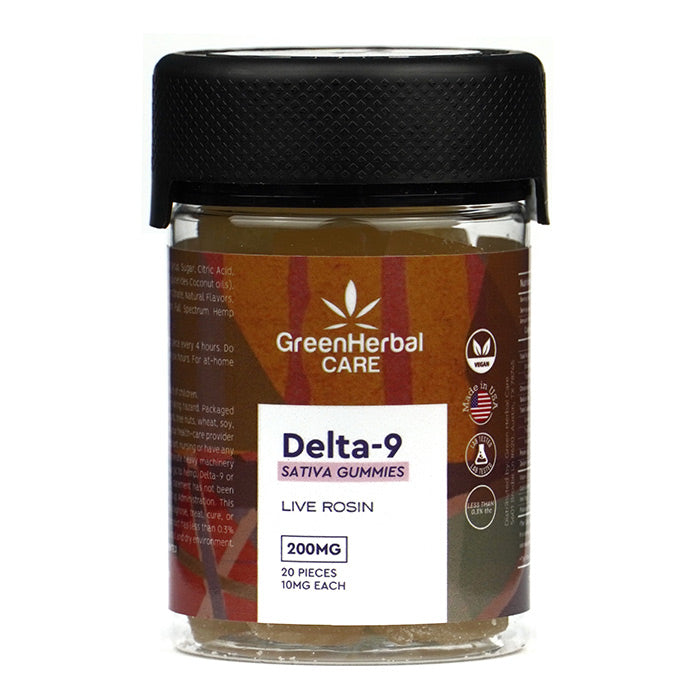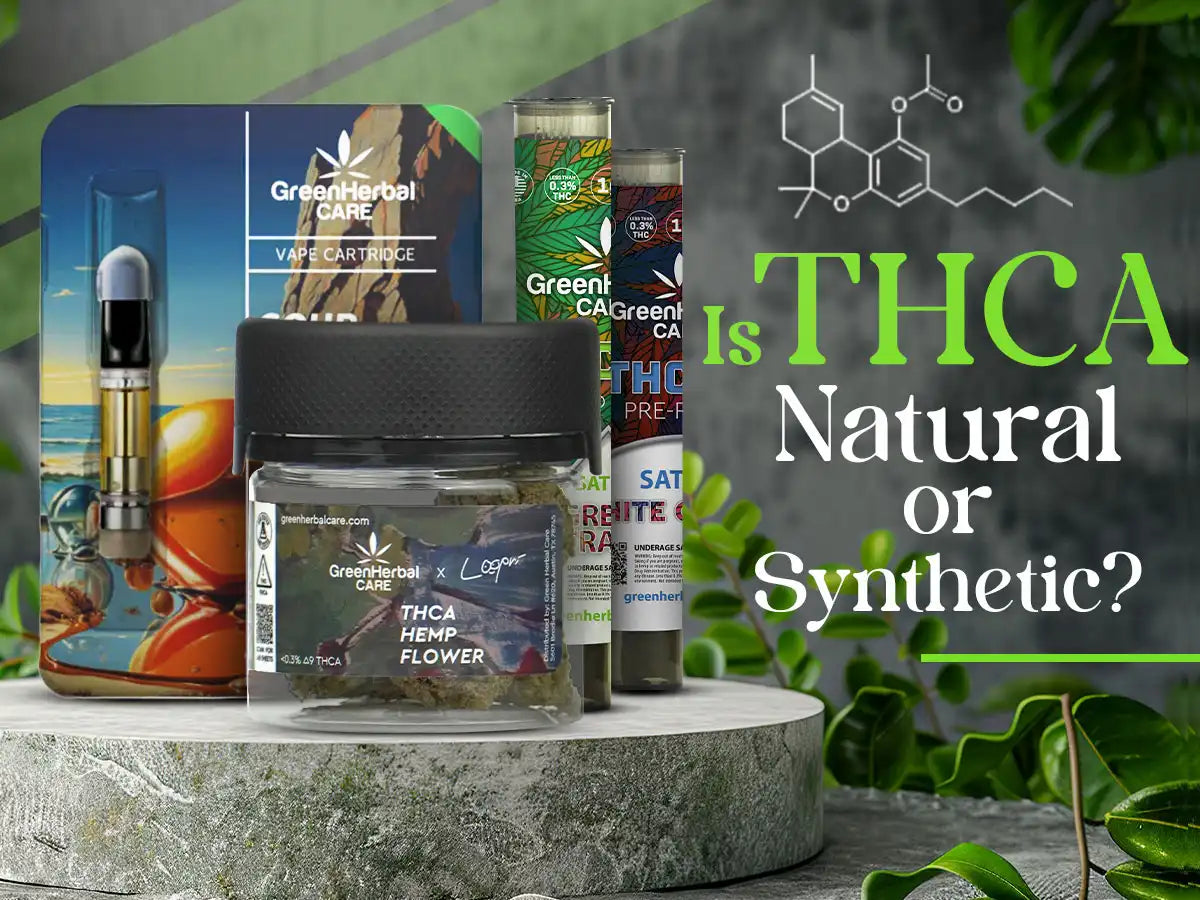THCA caught your attention, but there are a few points of curiosity you want satisfied before you try it. If the thought that THCA might be synthetic and not as natural as THC is one of these points, get ready to have your queries answered.
In today’s blog, our experts put together valuable information on THCA, from its production process to potential benefits and risks, to help you understand its authenticity before you add or discard THCA from your daily life.
THCA – Is It Natural or Synthetic?
One of the most common questions we get is: Is THCA natural or synthetic? The answer is—it can be both. THCA is the raw, acidic form of THC, naturally found in hemp and cannabis plants. However, as demand grows, some manufacturers produce synthetic THCA in labs to mimic its effects.
- Natural THCA: Manufacturers extract natural THCA directly from the hemp plant to retain all the original properties. Generally sourced from authentic sources, the plants are free from pesticide contamination.
- Synthetic THCA: Synthetic THCA, on the other hand, is produced in a lab through chemical synthesis. The result is a standardized product that may lack the full spectrum of natural properties.
Other than traces of pesticides, the source of THCA plays a significant role in drug tests. Natural THCA may contain slight amounts of compounds that could trigger false positive results in certain tests, but synthetic THCA produced in controlled laboratory settings is typically a purer form and may not carry the same risks of contamination.
So, if you have a drug test scheduled but don’t want to put down that vape, a synthetic THCA disposable vape may be a better choice.
A Little More on Natural THCA
In hemp plants, THCA occurs primarily as concentrates in trichomes, which are tiny resin glands on the surface of the buds. These are crystal-like structures that protect the plant from predators and work as the core of cannabinoid production.
In the trichomes, THCA interacts with other cannabinoids like CBD and THC to create a fusion of therapeutic effects.
Fun fact: THCA’s unique chemical makeup makes it a natural pest deterrent—just another magic of nature.
Shop THCA Products
Natural vs Synthetic THCA – The Difference
An important distinction between natural and synthetic THCA is their potency levels.
Natural THCA comes directly from the hemp plant, so it generally contains a mix of cannabinoids and terpenes that determine the compound’s overall effects. Synthetic THCA is lab-born under controlled conditions, allowing manufacturers to manipulate the product’s potency.
Understanding the differences also involves legal implications. Natural THCA falls under the regulations of the Controlled Substances Act as a Schedule I substance. Synthetic THCA may undergo different regulatory standards depending on specific production methods and jurisdiction.
Speaking of regulations, natural THCA production complies with strict regulations, but its synthetic counterparts may need to abide by additional quality control requirements to meet regulatory standards.
What have you decided so far? Will you order natural or synthetic THCA online on your next purchase?
THCA Production Process
Since THCA comes from the hemp plant, factors like soil, cultivation methods, and terpenes influence production. Farmers need to pay close attention to all elements for better overall health and development of the plants’s cannabinoid content.
Various factors, including environmental conditions, cultivation methods, and plant genetics can influence the terpene profiles. Long-established, reputable farms follow sustainable agricultural techniques to ensure high-quality THCA yields through optimal growing conditions and minimal use of synthetic chemicals.
Does THCA Get You High?Potential Benefits of THCA
As far as anecdotal evidence and user reports go, natural THCA has been a promising natural remedy. It has been used for neuroprotection, anti-inflammation, and pain relief. Since it is organic and boasts immense therapeutic potential, it has sparked great interest in healthcare.
Some studies suggest that THCA’s neuroprotective properties may be an effective way to reduce oxidative stress and protect brain cells from damage. Its anti-inflammatory properties may help alleviate various symptoms associated with arthritis and multiple sclerosis.
Like all other cannabinoids, THCA interacts with the endocannabinoid system (ECS), which may enhance its role in pain management and promoting overall health.
Until more research and concrete evidence are available, THCA may remain a mystery to many. But the future of utilizing this compound in different therapeutic settings is somewhat clear.
Potential Risks of THCA
The benefits and risks of natural and synthetic THCA are the same. The risks are primarily associated with substance abuse, dependence, and potential influence on mental health.
Since you can light up THCA flower Texas and transform it into potent THC, substance abuse becomes quite concerning. With synthetic THCA being widely available, the compound is easily accessible, which opens up the way for misuse.
Additionally, the artificial production of THCA raises concerns about its purity and effects.
The Big Question – Is Synthetic THCA Safe?
We know – the main concern about using synthetic THCA is whether it is safe. Since it’s produced in a lab, it must have solvents and altered nutrient profiles. So, is synthetic THCA safe?
The only way to ensure your THCA products are safe is to get them from a reputable brand that provides COA (certificate of analysis). This document gives you a detailed look into what’s in the item.
Safe products involve proper extraction, ventilation, and safety protocols to reduce potential risks of solvents. Also, understanding the nutrient content of the product is crucial to ascertaining it is free from impurities or harmful contaminants.
Does THCA Show Up on a Drug Test?
If you simply want a reliable vendor to buy safe THCA products from, shop from Green Herbal Care. You can visit one of our stores in Texas or order online from our website. All our products are third-party lab-tested and provide COAs to ensure you get nothing but the best!
Frequently Asked Questions
Is THCA synthetic?
It can be. While THCA naturally occurs in cannabis, lab-made synthetic versions also exist.
Is THCA flower natural?
Yes, THCA flower is natural when harvested from organically grown hemp or cannabis plants.
Is THCA natural or synthetic?
Both forms exist. Natural THCA is plant-derived, while synthetic THCA is lab-created.
Is THCA natural?
Yes, THCA is a naturally occurring compound in cannabis that converts to THC when heated.
Is THCA synthetic THC?
Not exactly. THCA is a precursor to THC. Synthetic THCA refers to lab-made versions that mimic the natural molecule.


